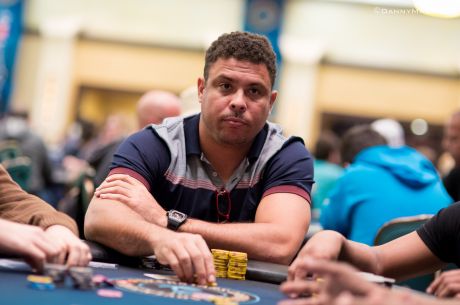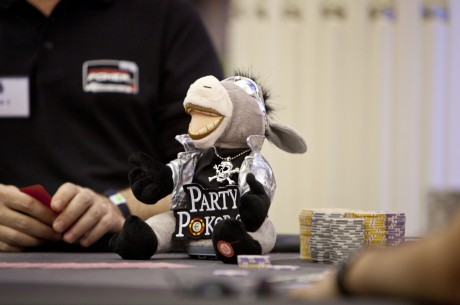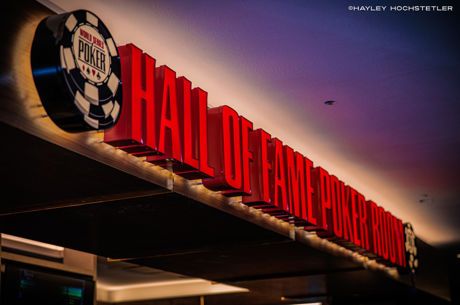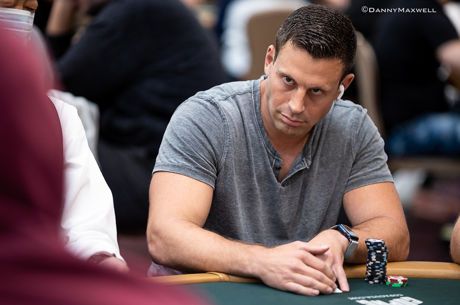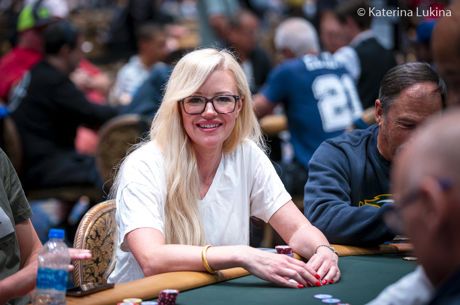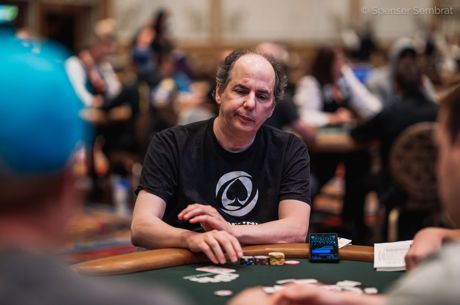Five Thoughts: Jaka the Homeless Millionaire, Greenstein the Lowball Millionaire
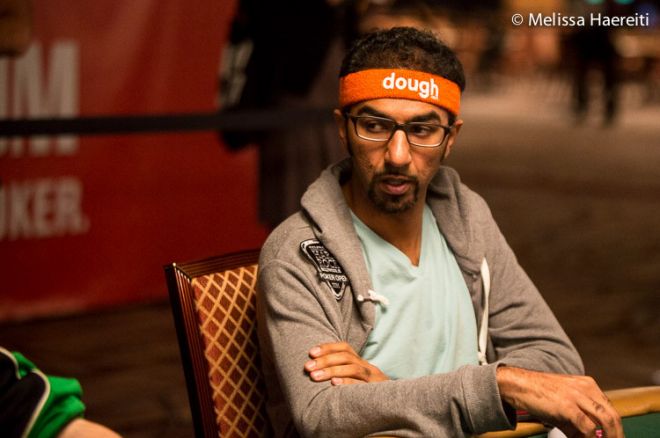
At the height of my PokerNews live reporting career, the question "where do you live?" was a tough one to answer. The only time I had a no-brainer response was when I was in an immigration line to enter a foreign country or return to the United States.
Hint: Always tell them the address on the passport.
When I first started traveling to poker tournaments outside of the WSOP, I was in graduate school in Brooklyn, NY. Crown Heights seemed to be equidistant from all three major airports - Newark, LaGuardia, and JFK - and all of them were a pain in the neck to travel to. After graduate school I spent half of my time at "home" in my parents' place in New Jersey, and the other half with my now wife in Trinidad and Tobago. As an American citizen I needed to monitor the amount of time I spent in Trinidad, not wanting to break any rules.
In between these two places you could find me on planes, trains, and automobiles in countries across the world. There was one stint in January of 2013 where I covered the PCA in the Bahamas, WSOP Circuit Choctaw in Durant, Oklahoma, and then the Aussie Millions in Melbourne, Australia. Chad Holloway was with me at all three stops, and we were exhausted by the end of it, but at the same time it was freeing to be able to skip around the world on a whim.
Traveling is one of the great benefits that come with the poker industry. What was once an American game is now a global offering, and dozens of countries around the globe now run major poker tournaments each year. Since Black Friday traveling has become more important for those who want to continue grinding online poker against massive player pools, and it's also become more sophisticated. Services like Airbnb allow travelers to rent rooms, apartments, and even homes for vacation, and companies like Uber ease the pain of taxiing across a foreign city or town.
Some poker players take advantage of the traveling, fully immersing themselves in the cities they visit. Others tend to relax in the highly-rated hotel rooms they've book and eat at the local Subway. One player whose dedicated to maximizing his experiences when he travels is Faraz Jaka, who was recently profiled on CNN Money.
1. Homeless Millionaire Poker Player
That's a pretty catchy headline. Hell, even if I wasn't into poker that is a story I'd want to learn more about.
Jaka joined the PokerNews Podcast back in October to discuss the very same subject. He had just made the final table of the WCOOP Main Event in Mexico City and was planning to stay for a few more weeks just to explore.
With his free spirit and love for travel it's easy to assume that Jaka just drifts from location to location on a whim, but instead he has nearly everything planned out ahead of time. On the podcast he said that he's a spreadsheet lover, and at the time he already had the majority of his poker trips planned out for the first few months of 2015.
In his two-minute video for CNN Money, Jaka says he played in 102 poker tournaments in 2014. During that time, he traveled to 47 cities in 13 countries, taking 52 flights.
"I realized that the only way I was going to actually experience [all] these places was if I got rid of my home - so, I just did that."
The first rebuttal from a cynic would be that Jaka can afford this lifestyle because he's won millions of dollars playing poker, but remember he literally has no home and is only toting two small suitcases. If he is limiting his material possessions that dramatically, then his expenses are minimal. Think about how many small personal purchases you make in a week or a month.
Jaka's views on short-term goals are also valuable for anyone, not just poker players or fans.
"A lot of people are chasing short-term goals," he says. "When they get those things - that doesn��t make them happy. Real happiness comes from being aware and having a purpose."
When we reach these small achievements, what do we really gain? Are they worth out investment?
Beyond his wealth, it is a bit easier to embrace this lifestyle as a 29-year-old bachelor with no kids. It's extremely difficult to maintain this free-spirited mentality when you've settled down, at least for most individuals living in these circumstances. Jaka would likely argue with this sentiment, questioning the status quo, and that's what makes him who he is.
The potential for wealth is a big reason why people choose to be professional poker players. They want to make money. Simple. But beyond wealth, there is an opportunity to gain freedom by earning income how you want, when you want. Jaka has taken this concept of freedom a step further, and I'm very glad his story reached a substantial audience on CNN Money.
2. Greenstein Talks History of Poker, Winning $5 Million in 2003
In 2003, Chris Moneymaker defeated Sammy Farha heads up to win the WSOP Main Event, earning $2.5 million and changing the poker landscape forever.
"I remember laughing when people said [Moneymaker] was the biggest winner," Barry Greenstein told PokerNews during the 2015 PCA. "He won $2.5 million and I said, 'Well, I won twice that.'"
In a bonus cut from a four-part interview, Greenstein says that he won more than $5 million playing in Las Vegas cash games during the 2003 WSOP. Initially he was weary of playing in Sin City due to rumors of cheating, so he stayed in Los Angeles. The Robin Hood of Poker was dedicating his time to lowball variants - 2-7 and ace-to-five - and one day he beat up Sailor Roberts, who was believed to be the best lowball player in Las Vegas.
"You will kill them, it will be a bloodbath," Roberts told Greenstein. "These players in Vegas think they are the best in the world."
There are two things about this bonus cut that I absolutely love. One is Greenstein's storytelling, which has always been a strength of his. Ace on the River can read more like a novel than a poker strategy book, and his appearances on the TwoPlusTwo Pokercast are always accompanied with long, fascinating stories from his past. On camera, Greenstein's tale is accentuated by his wry smile and his now elderly appearance.
It's not long ago that Greenstein, 60, could sit down at a table with Doyle Brunson and Chip Reese and look like a spry, young fellow.
If you want to watch the entire four-part interview with Greenstein, head here.
Starting with his first recorded cash in 1992 - a 22nd-place finish in the WSOP Main Event - Greenstein has more than $8 million in live tournament earnings. However, Greenstein hasn't had a seven-figure year since 2004 and has only earned $1,351,811 since the start of 2009.
In 2014, Greenstein had his lowest earning year since winning that $5 million in cash games in 2003, cashing only five times for a total of $35,887.
We can't be sure of Greenstein's success in live cash games because there isn't a High Stakes DB to track his progress, but it's fair to assume that he isn't raking in millions of dollars a year like he did during the summer of Moneymaker's big win. Poker has become increasingly more difficult for all players, not to mention those whose strengths lie in seven-card stud and lowball. Regardless of recent success it's always great to see Greenstein on the circuit, and even better when he's spinning a tale about past experiences on the felt.
3. Hendon Mob Planning to Sue Poland's Finance Ministry
You read that correctly. The Hendon Mob, the world's largest database dedicated to live poker, is planning to sue Poland's Ministry of Finance, per GPI CEO Alexandre Dreyfus.
Dreyfus claims that representatives from Poland are violating the site's terms and conditions, attempting to steal data from the database.
"Since December 29, we have seen a bot coming from the servers of mf.gov.pl that is crawling the whole website," Dreyfus explained to PokerNews. "We have tried to fight it, and we blocked it."
Dreyfus tweeted about his concerns:
.We will SUE @MF_GOV_PL if you use that information @thehendonmob for any claim.
— Alexandre Dreyfus (@alex_dreyfus)
Jacek Kapica, Poland's Deputy Finance Minister, replied with:
@alex_dreyfus If you have evidences go to the prosecutor immediately. @MF_GOV_PL
— kapicajacek (@kapicajacek)
It appears as if Dreyfus will take up the minister's challenge, claiming a violation of the EU Database Directive, adopted by the European Commission in 1996:
"Repeated and systematic extraction and/or reutilization of insubstantial parts of the contents of the database implying acts which conflict with a normal exploitation of that database or which unreasonably prejudice the legitimate interests of the maker of the database shall not be permitted."
It will be interesting to see where, if anywhere, this lawsuit goes. Kapica has spoken critically about poker in the past, and these allegations and actions will not soften his stance. In November of 2014, Polish gaming regulators were considering implementing legislative changes to loosen the country's tight gaming restrictions.
After winning the 2014 PCA Main Event, Dominik Panka became a friendly face for those fighting for legalization and regulation in Poland. PokerNews will be sure to monitor these activities moving forward.
4. Sports Betting and PokerStars
Last week, Amaya Gaming announced that they will be launching a sports-betting platform on PokerStars by the end of April. This is all a part of Amaya CEO David Baazov��s plan to leverage the PokerStars brand name and execute as many gaming verticals as possible with it.
Amaya recently attempted to institute rake increases on PokerStars, creating a large rift within the poker community. Less than two months after announcing the increases, PokerStars cancelled most of them, retaining the higher rake for Spin & Go tournaments.
��After additional analysis and consideration, we have now returned the rake to pre-November 3 levels in most instances and have cancelled the planned additional increases,�� Eric Hollreiser, Head of Corporate Communications for PokerStars and Amaya Inc., said on the PokerStars Blog. ��We will not increase any rake in 2015 other than in jurisdictions where we have already or will experience increased gaming duty or VAT.��
The upcoming introduction of sports betting has met some opposition within the poker community, but it hasn��t been as ferocious as rake increases. It will be a revolutionary change for the world��s number one poker site, but if New Jersey is any indication, the customers don��t necessarily want to just play poker.
According to the New Jersey Division of Gaming Enforcement, 81 percent of the market in December was casino. As much as we want to push poker because it��s the game we love and, more importantly, it��s a game of skill, you got to give the people what they want. If the customers want to play online slots then, as a business, it��s wise to offer online slots.
As a fan of sports betting, I am interested to see if this leads to any kind of developments within the United States. NBA commissioner Adam Silver recently voiced his support for legalized and regulated sports wagering, which is unprecedented coming from one of the major sports leagues in the U.S., and the state of the New Jersey continues to fight to offer it in their land-based casinos. Unfortunately for them, they��ve received strong opposition from the NCAA and other sports entities.
Sports betting doesn��t carry the same stigma that casino gaming does. Thanks to broadcasters like Hank Goldberg, and now guys like Bill Simmons and Colin Cowherd, the ��spread�� is no longer a dirty word in sports. Betting lines and over/unders are now a part of everyday nomenclature.
So far, PokerStars�� future foray into sports betting hasn��t created much noise, but we��ll be back to take the temperature of the people closer to April.
5. Nominees for Australian Poker Hall of Fame
Only one person, Graeme Putt, has been elected to the Australian Poker Hall of Fame the last two years. This year that nay change, as six nominees have been announced, according to Poker Asia-Pacific.
The six are Van Marcus, Joe Cabret, Michael Guttman, Tino Lechich, David Steicke, and Grant Levy. From a pure earnings standpoint, Steicke is the strongest candidate. In 2009 he won the Aussie Millions $100,000 Challenge, earning AU$1.2 million. Steicke sits at sixth on the all-time Australian money list with $3,364,260 in live tournament earnings.
Levy is a player that might not stand out at first, but he has more than $2 million in career lifetime earnings, including a third-place finish in the 2007 PokerNews Cup. Levy has an APPT title, an ANZPT title, a win in a $5,000 side event at the 2013 PCA, and he reached one of the toughest final tables in poker history at the Season 9 EPT Grand Final Main Event. He unfortunately fell in eighth place, earning $135,059.
Personally, I don��t feel like I��m qualified to tell you who should enter the Aussie HOF. I don��t have enough vegemite in my blood. That said, I��ll be keeping an eye out to see if anyone is honored this year. Ever since covering the Aussie Millions for the first time in 2013, I��ve become fascinated with Australia��s love for poker. Having worked with Aussies in the industry I knew that Joe Hachem��s win had a big effect on the country, but I didn��t properly understand their love for the game until I covered those marquee events.
It wasn��t just the buzz in the lower buy-in events, which were filled with amateurs looking for a big score. The atmosphere around the big buy-in events was unlike anything I had scene �C even at the WSOP. Fans lined up and down the rail to catch a glimpse of the action and to lay their eyes onto some of their poker heroes. The fanfare was so concentrated that last year, the folks at Crown moved the $250,000 Challenge out of a private room and down onto the casino floor.
The fans loved it.
I am pro almost anything Australian, and will give a standing O to whomever is inducted this year. Good luck to all of those in the 2015 Aussie Millions!
Get all the latest PokerNews updates on your social media outlets. Follow us on Twitter and find us on both Facebook and Google+!

